Are you low on energy? Easily fatigued? Have you made positive changes in your diet and exercise habits but still feel utterly exhausted most of the time? Does your doctor suspect you may be struggling with Chronic Fatigue Syndrome or Fibromyalgia? Have you or a direct relative been diagnosed with Parkinson’s disease, Autism, Alzheimer’s disease, Lou Gehrig’s disease (ALS), Muscular Dystrophy, Epilepsy, Myopathy, Developmental Delay or learning disabilities? If you answered yes to any of these questions than you may be at risk for mitochondrial disease or dysfunction? Please read on to learn more about this cellular level issue that affects the very energy needed for the human body to be sustained. Hopefully the information I share with you about mitochondrial disease and dysfunction will give you new insight into your health and help you on the road to recovery.
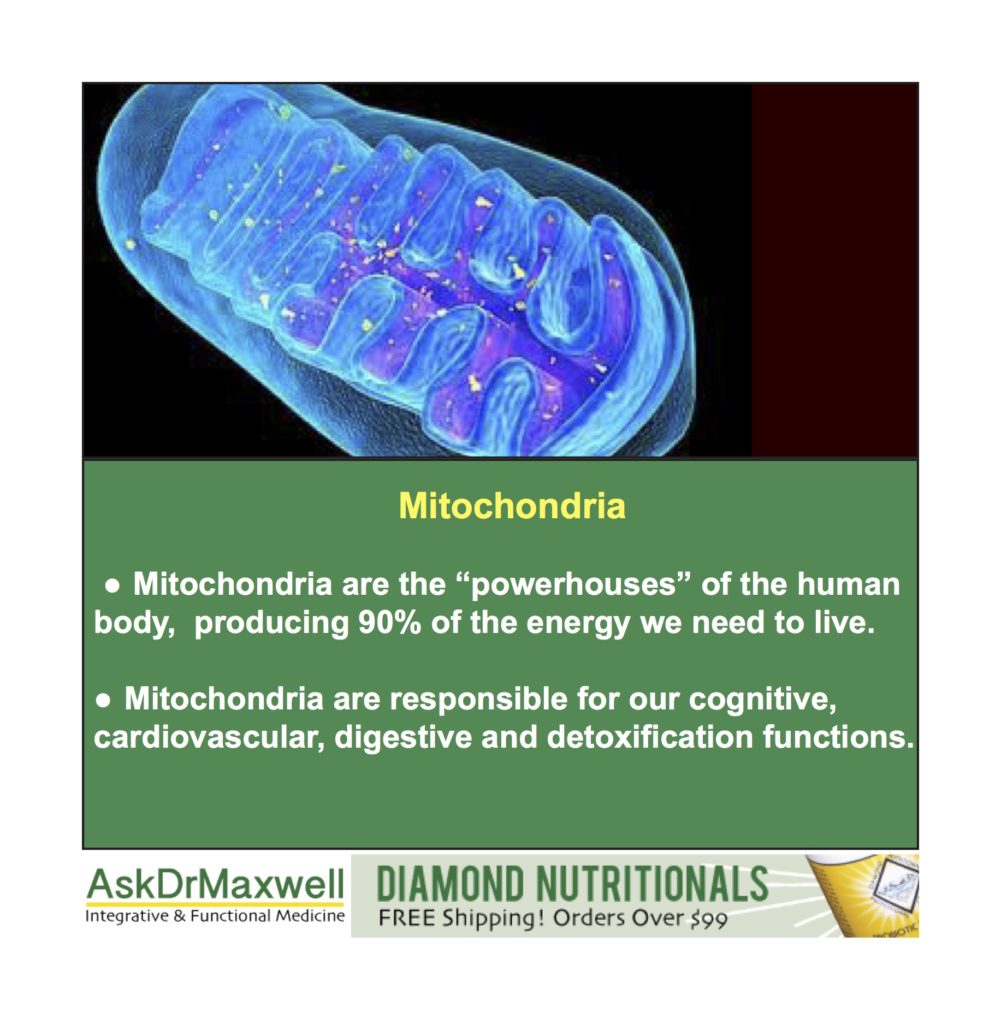
What Are Mitochondria?
Mitochondria are known as the “powerhouses” of the human body because they produce all of the essential energy needed for the brain, heart, liver, kidneys, and bowels to function healthily. We have more than 100 quadrillion mitochondria located throughout our cells and they are responsible for creating 90% of the energy humans need to live. Without healthy and properly functioning Mitochondria, we cannot grow from infancy to adulthood and our bodies do not have the energy needed to sustain daily living and normal bodily functions such as maintaining cardiovascular/heartbeat rhythms, cognitive processes and digestion.
Mitochondria are found in all cells in the body that contain genetic material. In these spaces, they process oxygen, as well as convert substances from the foods we eat, into energy in the form of adenosine triphosphate (ATP). ATP is the fuel the human body uses to power its systems. After mitochondria produce ATP, it is transported throughout the body giving our cells, organs, and tissues the vital energy they need to function well. Mitochondria are so active in energy production that they utilize all but ten percent of the oxygen we take in each day.
Mitochondrial Dysfunction
Mitochondria are critical to the maintenance of human energy and wellbeing. Even a slight variation to their processes can wreak havoc on their ability to produce the energy needed for the human body to operate properly and be healthy. This is of concern, especially since mitochondria are very sensitive to a host of internal and external factors and as a result, they are easily damaged.
Toxins, allergens, infections, stress, poor diet, prescription and non-prescription drugs all play a role in damaging mitochondria. As mitochondria experience substances that are toxic to them, they become dysfunctional or even shut down. Other mitochondria pick up the slack and become stressed and dysfunctional, potentially leading to mitochondrial damage on a systemic scale. If ones mitochondrial function becomes weakened low energy levels occur throughout the body. If ones mitochondrial function ceases progressive disease and illness occurs.
For those struggling with an ongoing medical condition like heart disease or epilepsy it is an upsetting reality that the very medications used to treat these disorders are known to be toxic to mitochondria. This is why it is so important that those who are on prescription medication supplement with natural and proven products that support and promote healthy mitochondrial function.
Time and again I see patients who come to me exhausted and unwell and as we look into their health history and note their life practices, we begin to see a picture of depleted mitochondria, whether due to a chronic illness like diabetes or fibromyalgia, stress, ongoing prescription medication usage or cancer treatments. As we work to reorient the patient’s lifestyle to include healthy activities, stress lowering practices and a healthy diet, and we include certain natural supplements that boost and support mitochondrial function and ATP energy levels in the body, we see major transformations in health and wellbeing.
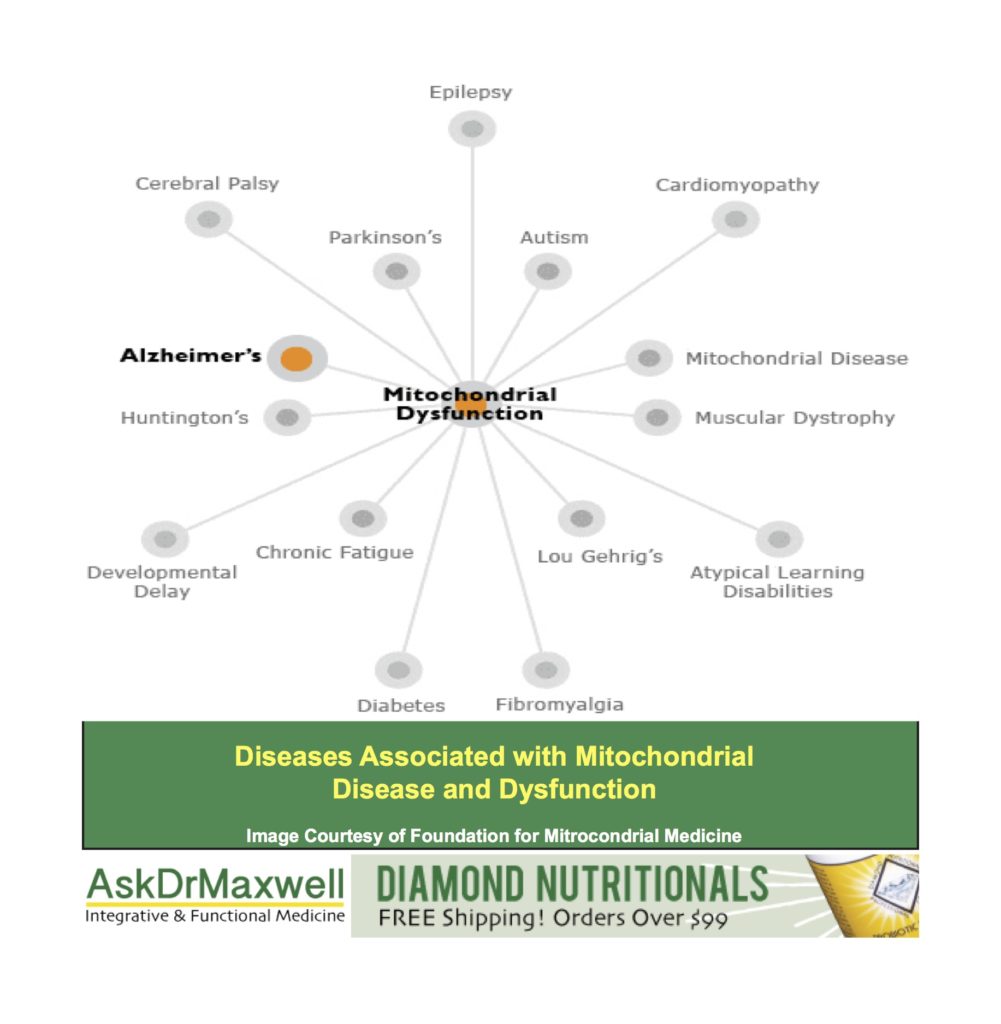
Mitochondrial Disease
When Mitochondria convert food and oxygen into energy (ATP) it is a highly specific process that includes hundreds of chemical reactions. If these chemical reactions do not run smoothly then an energy crisis results and cells, organs and the body cannot function properly. Mitochondrial Disease can cause complete collapses in energy for a specific bodily function such as causing the heart to cease working or it can cause smaller lapses in energy, which affect the body in a less severe way such as slow bowel motility (resulting in constipation). Mitochondrial Disease can be mild or fatal and can affect the cells of the brain, nerves (including the nerves to the stomach and intestines), muscles, heart, pancreas, kidney, liver, eyes, ears, or pancreas.
Symptoms of Mitochondrial Disease
Symptoms of Mitochondrial Disease can include poor growth, loss of muscle coordination, exhaustion, muscle weakness, visual and/or hearing problems, developmental delays, learning disabilities, heart disease, liver disease, kidney disease, gastrointestinal disorders, severe constipation, respiratory disorders, diabetes, increased risk of infection, neurological problems, seizures, thyroid dysfunction, and dementia (mental disorder characterized by confusion, disorientation, and memory loss).
Who Gets Mitochondrial Disease?
Every year in the United States, anywhere from 1,000 to 4,000 children are born with Mitochondrial Disease. Mitochondrial Disease can also develop during childhood or adult hood, affecting about one in 2,500 people in the Unites States. Mitochondrial disease is most often passed on through genetic mutations but some patients acquire the disease as a result of mitochondrial toxins harming and inhibiting the mitochondrial function in their bodies, causing it to cease in some places and thus causing them to develop Mitchondrial Disease.
How is Mitochondrial Disease Diagnosed?
For many years Mitochondrial Disease was a lesser-known disease, and this meant that many people suffering from Mitochondrial Disease or Dysfunction were either misdiagnosed or not diagnosed at all. In the last ten years, Mitochondrial Disease and Dysfunction has been gaining momentum in the medical community and breakthroughs in research and awareness have led to diagnostic criteria. Physicians experienced with Mitochondrial Disease take a close look at patient and family history and then perform metabolic testing muscle testing and genetic testing.
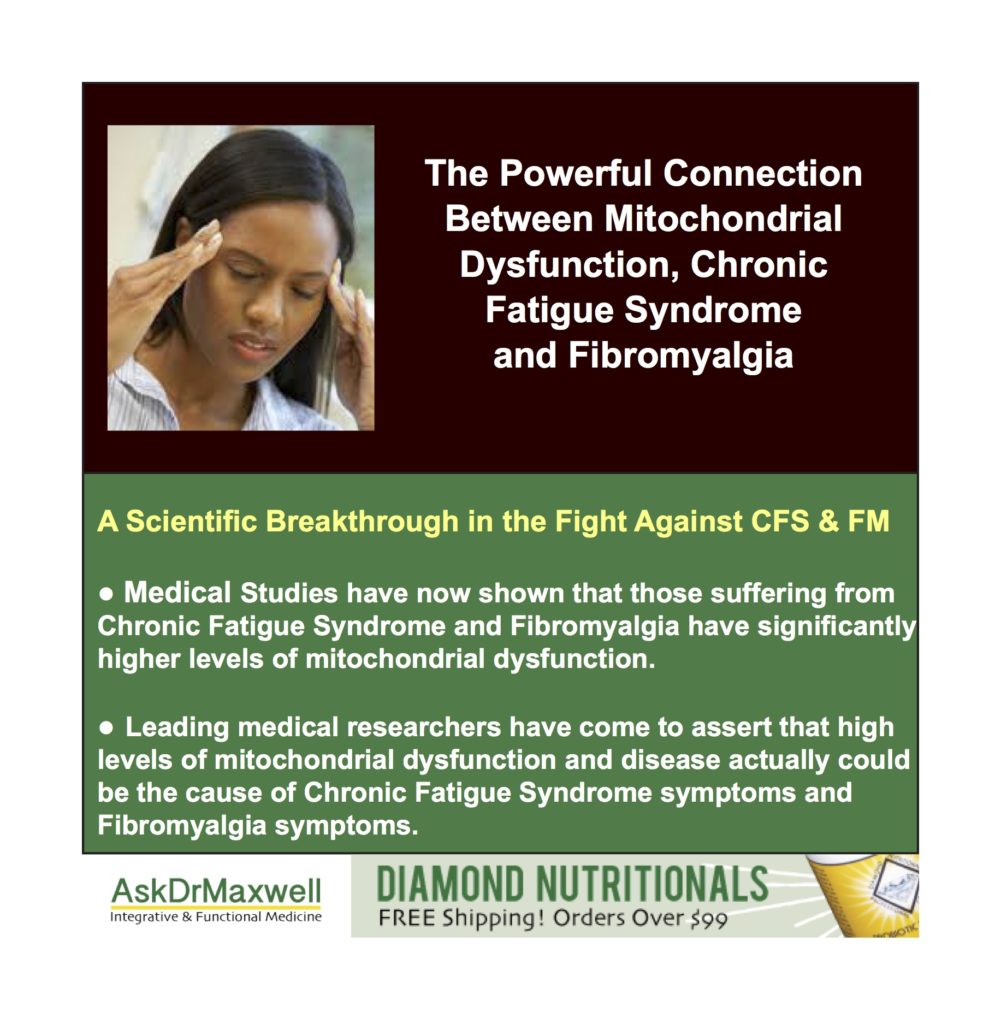
Why Mitochondrial Disease and Dysfunction Is Often Confused for Other Well Known Diseases
Leading medical research into Mitochondrial Disease and Dysfunction has confirmed a surprising fact about mitochondrial function; that it is involved in most well known diseases and disorders such as Parkinson’s disease, Autism, Alzheimer’s disease, Lou Gehrig’s disease (ALS), Muscular Dystrophy, Epilepsy, Myopathy, Developmental Delay and Learning Disabilities. For this reason, sometimes it is difficult for doctors to determine if one is suffering from mitochondrial disease or dysfunction or has another disease at play. Medical researchers are beginning to see mitochondrial dysfunction as the axis through which all disease seems to be connected.
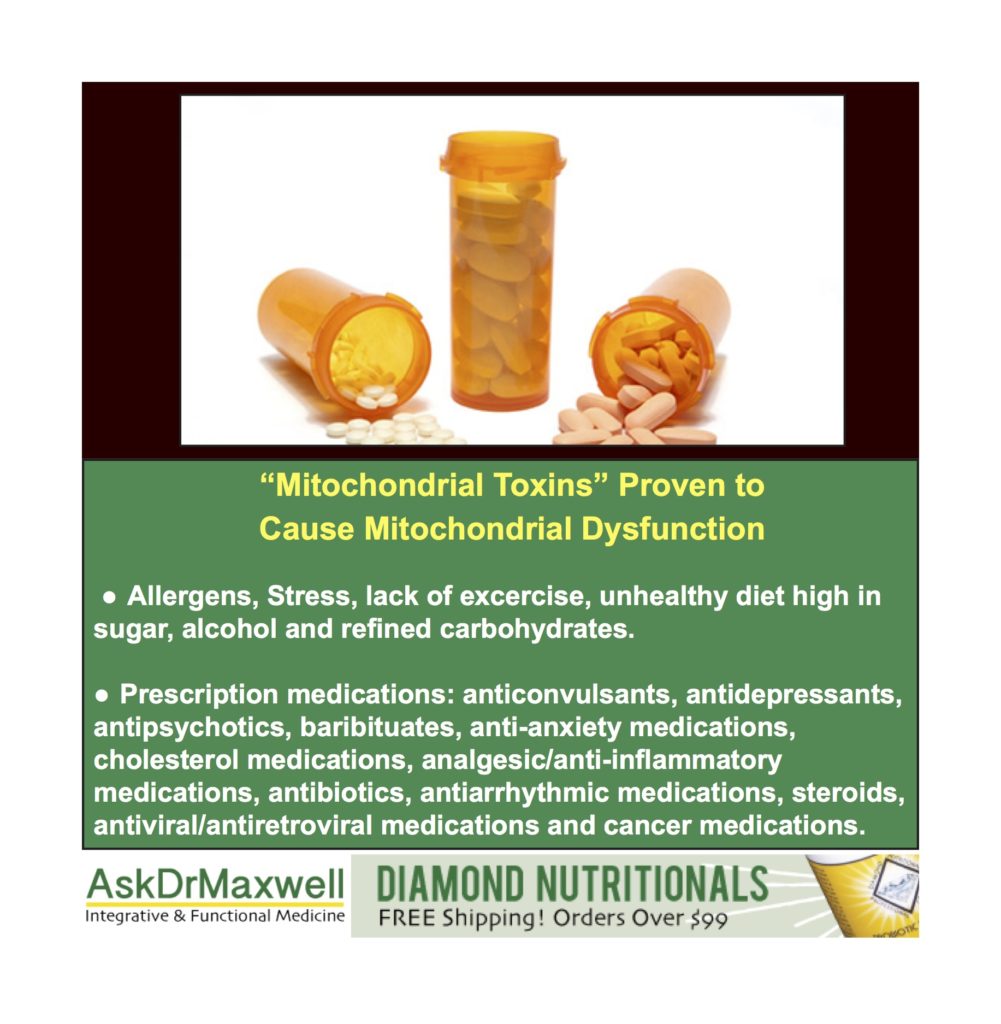
Mitochondrial Dysfunction May Be the Root Cause of Chronic Fatigue Syndrome and Fibromyalgia Symptoms
In 2009, leading researchers in the fields of Mitochondrial Disease, Chronic Fatigue Syndrome, and Fibromyalgia discovered a significant connection between mitochondrial disease and dysfunction and individuals suffering from Chronic Fatigue Syndrome and Fibromyalgia. Those suffering from Chronic Fatigue Syndrome and Fibromyalgia symptoms have significantly higher levels of mitochondrial dysfunction. From this realization, these researchers have come to conclude that high levels of mitochondrial dysfunction may be the cause of Chronic Fatigue Syndrome and Fibromyalgia symptoms.
Treating Chronic Fatigue Syndrome and Fibromyalgia
Treatment of Chronic Fatigue Syndrome and Fibromyalgia is often done with lifestyle changes, supplements and drugs. While I encourage lifestyle changes and naturally derived supplements to help treat these diseases, I am concerned about the use of prescription and non-prescription drugs to treat Chronic Fatigue Syndrome and Fibromyalgia. I say this because leading medical research proves that many of the drugs used to treat Chronic Fatigue Syndrome and Fibromyalgia symptoms such as anti-depressants, anti-anxiety, anti-inflammatory medications cause mitochondrial toxicity. If Mitochondria disease and dysfunction is at the root of Chronic Fatigue Syndrome and Fibromyalgia symptomology then taking drugs that inhibit healthy mitochondrial function is not a good idea. What I would suggest is taking supplements such as Mitochondrial Formula. This product was created for patients suffering from mitochondrial disease and dysfunction to help boost their mitochondrial function and bring their ATP energy levels up. Many of my patients suffering from Chronic Fatigue Syndrome and Fibromyalgia who are taking Mitochondrial Formula have seen great improvement in their symptoms and some have even become symptom free.
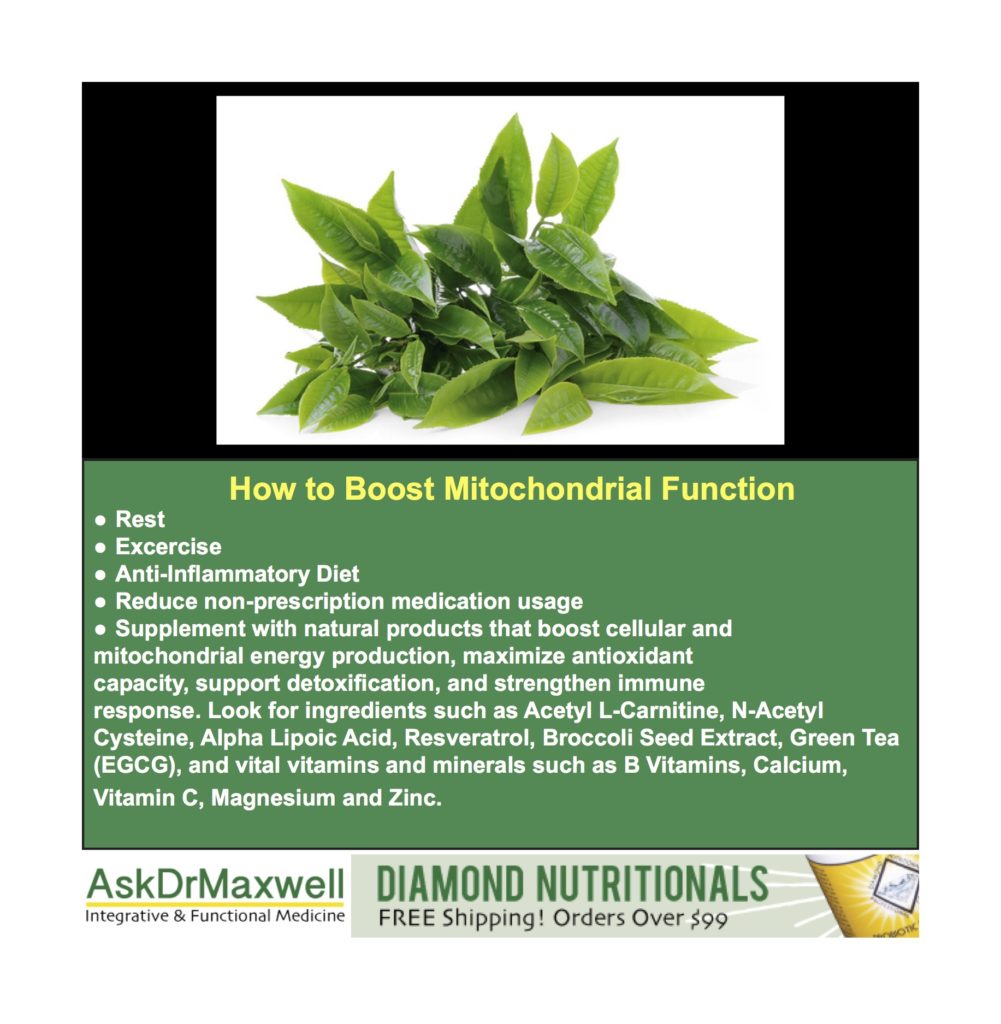
How to Treat Mitochondrial Dysfunction and Reclaim Your Health Naturally
Sleep, Stress Reduction & Exercise
Making sure that you sleep well, pace yourself at work and home, practice stress-reducing activities such as meditation, and taking part in low-impact physical activity such as walking or swimming, will help support dysfunctional and diseased mitochondria and make the job of your still functioning mitochondria that much easier. Practicing these simple lifestyle changes will go a long way in helping to support and boost your mitochondrial function and boost your body’s energy making capabilities.
Anti-Inflammatory Diet
Eating an anti-inflammatory diet that focuses on healthy oils, greens, nuts and anti-inflammatory fruits will have a very positive effect on your mitochondrial function. To be most effective in supporting and boosting your mitochondrial function, your diet should also be low in refined sugars, alcohol and carbohydrates. I have seen great improvement in many of my patients who make such diet changes.
Avoid Allergens and Overusing Non-Prescription Medications
Avoiding food and environmental allergens, as well as the over-use of non-prescription drugs such as pain-relievers and anti-inflammatories, will definitely give your working mitochondria relief and allow them to work more stealthily towards your health and wellbeing.
If You are Suffering from a Long Term Medical Condition and Need to Use Prescription Medication on a Daily Basis Use Mitochondrial Support Supplements
If you are regularly using prescription drugs used to treat health conditions such as diabetes, cardiovascular disease, anxiety, depression or arthritis, then it is important to be aware that many of the prescription drugs used to treat such illnesses cause mitochondrial depletion, dysfunction and disease. For this reason, I always suggest that any of patients who need to use prescription drugs for the long term regularly supplement with natural products that support and boost mitochondrial function and help increase ATP energy in the body like Mitochondrial Formula.
How to Support Mitochondrial Function, Boost Your Energy & Help to Defeat Chronic Disease and Illness
For many years I have known the power of optimal mitochondrial function in defeating low energy, chronic illness and disease and so I have been successfully treating my patients with such issues with Mitochondrial Formula. This product was designed to effectively improve mitochondrial function and boost ATP energy levels throughout the body. This product has brought great relief and good health to many of my patients struggling with mitochondrial dysfunction and chronic illness. I believe that it can do the same for you. Please read on to see the powerful and effective ingredients in Mitochondrial Formula, which will recharge your cellular energy production, support immune function, increase antioxidant capacity and support detoxification capacity.
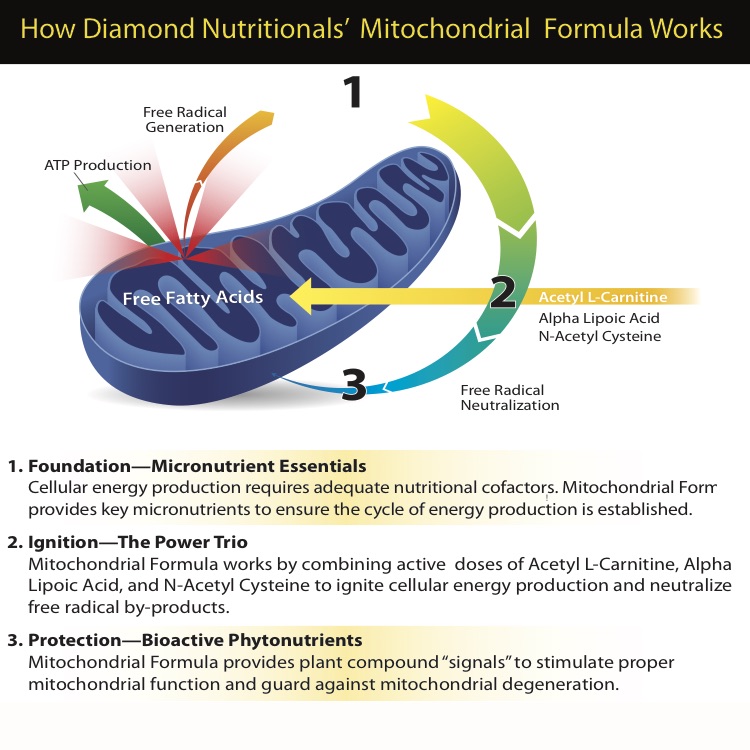
A Mitochondrial Formula Proven to Work
Mitochondrial Formula effectively boosts cellular and mitochondrial energy production, maximizes antioxidant capacity, supports detoxification, and strengthens immune system response. This all-natural formula, based on peer-reviewed, double blind research, consists of a unique blend of acetyl L-carnitine, alpha lipoic acid and N-acetyl cysteine which are known to dramatically increase energy output and immune system function. Mitochondrial Formula also contains key micronutrients and phytonutrients including green tea, broccoli seed extract and resveratrol, to help protect mitochondrial function and promote continual renewal of the body’s cycle of energy production.
Acetyl L-Carnitine
Acetyl L-carnitine (ALC) is an amino acid that is known to increase energy production in the body. It has been shown to increase the flow of free fatty acids, the very fuel source for mitochondria, resulting in a significant boost in energy production. ALC also increases cellular energy (ATP) production, the very type of energy that mitochondria work so hard to create. ACL has been shown to protect CD4 and CD8 immune cells, which help to eliminate invading antigens. Finally, ACL, (in combination with lipoic acid), has also been shown to lower oxidative stress in the body.
N-Acetyl Cysteine
N-acetyl cysteine (NAC) is an antioxidant that scavenges free radicals and promotes liver detoxification. NAC has been shown to increase production of glutathione, (an important antioxidant found in the body), and to boost the immune system by activating T-cells in the body.
Alpha Lipoic Acid
Alpha lipoic acid (ALA) is a potent antioxidant on its own but it also plays a synergistic role in recharging other antioxidants in the body such as vitamin C, vitamin E, CoQ10 and glutathione. Lipoic acid is a key player in whole body detoxification and it has been shown to (in combination with ALA and ALC) minimize oxidative damage. For those struggling with mitochondrial dysfunction, disease or any other illness, this is an incredible facet of ALA. After all, oxidative damage can cause damage to DNA, RNA, proteins, mitochondrial membranes and lipids, essentially causing the decline and dysfunction of mitochondria and thus, negatively affecting the function of every major organ in the body.
Resveratrol
Resveratrol is a polyphenol molecule found in grapes and cranberries. Polyphenols act as antioxidants that protect plants from damage that can be caused by bacteria, fungi and radiation. Resveratrol does the same preventative and protective action for the human body. Resveratrol also offers incredible benefits for cardiovascular function and immune system function. It is believed to be the dietary factor behind the “French Paradox,” which is the high rate of cardiovascular wellness in the French population, despite their high fat intake.
Broccoli Seed Extract
Broccoli seed extract contains a high amount of glucoraphanin, a compound that is a precursor to sulphoraphane which is a potent antioxidant in the body that supports detoxification and immune system response.
Green Tea (EGCG)
Green tea polyphenols have been proven to have powerful antioxidant, probiotic, and immune supporting properties for the human body. Green tea polyphenols support antioxidant activity by forming complexes with free radicals and neutralizing them, thus minimizing oxidative damage throughout the body. Green tea polyphenols also stimulate liver detoxification enzymes which promotes detoxification of harmful chemicals out of the body.
The Micronutrient “Backbone”
To increase cellular energy production efficiently, optimal levels of critical nutrients have been included in Mitochondrial Formula. Included are powerful vitamins and minerals such as important B Vitamins, Calcium, Vitamin C, Magnesium, and Zinc because I believe that these nutrients are the backbone of increasing energy output and meeting daily nutritional needs.
Concluding Thoughts on the Importance of Healthy Mitochondrial Function
Whether one has been diagnosed with mitochondrial disease or is simply suffering from mitochondrial dysfunction as part of a larger picture of disease or chronic health issues, leading medical researchers are concluding that good mitochondrial function is the key to health and wellness. Lifestyle and diet changes can go a long way in supporting mitochondrial function but more often than not, depleted or dysfunctional mitochondria need direct support to be able to return to optimal levels of performance and energy output. I have understood the power of mitochondria in returning my patients to health and wellness and have recommended Mitochondrial Formula with this in mind. So many of my patients are living symptoms free and enjoying their highest levels of health by changing their lifestyle habits and using this powerful natural supplement.
References
- Ames, B. N. Optimal micronutrients delay mitochondrial decay and age-associated diseases. Mech Ageing Dev 2010; 131(7-8):473-479.
- Ames, B. N. and Liu, J. Delaying the mitochondrial decay of aging with acetylcarnitine. Ann N Y Acad Sci 2004; 1033:108-116.
- Arpa J, Cruz-Martinez A, Campos Y, Gutierrez-Molina M, Garcia-Rio F, Perez-Conde C, Martin MA, Rubio JC, Del Hoyo P, Arpa-Fernandez A, Arenas J. Prevalence and progression of mitochondrial diseases: a study of 50 patients. Muscle Nerve. 2003;28:690–5
- Chinnery PF, DiMauro S, Shanske S, Schon EA, Zeviani M, Mariotti C, Carrara F, Lombes A, Laforet P, Ogier H, Jaksch M, Lochmüller H, Horvath R, Deschauer M, Thorburn DR, Bindoff LA, Poulton J, Taylor RW, Matthews JN, Turnbull DM. Risk of developing a mitochondrial DNA deletion disorder. Lancet. 2004;364:592–6.
- Chinnery PF, Howell N, Lightowlers RN, Turnbull DM. MELAS and MERRF. The relationship between maternal mutation load and the frequency of clinically affected offspring. Brain. 1998;121:1889–94.
- Chinnery PF, Turnbull DM. Epidemiology and treatment of mitochondrial disorders. Am J Med Genet. 2001;106:94–101.
- Ciafaloni E, Santorelli FM, Shanske S, Deonna T, Roulet E, Janzer C, Pescia G, DiMauro S. Maternally inherited Leigh syndrome. J Pediatr. 1993;122:419–22.
- Deufel, T. Determination of L-carnitine in biological fluids and tissues. J Clin Chem Clin Biochem 1990; 28(5):307-311.
- Di Marzio L, Moretti S, et al. Acetyl-L-carnitine administration increases insulin-like growth factor 1 levels in asymptomatic HIV-1-infected subjects: correlation with its suppressive effect on lymphocyte apoptosis and ceramide generation. Clin Immunol 1999; 92(1):103-110.
- DiMauro S, Schon EA. Mitochondrial DNA mutations in human disease. Am J Med Genet. 2001;106:18–26
- Fahey JW, Talalay P. Antioxidant functions of sulphoraphane: a potent inducer of phase II detoxification enzymes. Food Chem Tox 1999:37:973-979.
- Green Tea. Altern Med Review 2000; 5(4):372-5.
- Hagen, TM, Liu J, et al. Feeding acetyl-L-carnitine and lipoic acid to old rats significantly improves metabolic function while decreasing oxidative stress. Proc Natl Acad Sci U S A. 2002; 99(4):1870-1875.
- Kaiser JD, Campa AM, Ondercin JP, Leoung GS, Pless RF, Baum MK. Micronutrient supplementation increases CD4 count in HIV-infected individuals on highly active antiretroviral therapy: a prospective, double-blind, placebo-controlled trial. J Acquir Immune Defic Syndr 2006; 42(5): 523-528.
- Morató L, Bertini E, Verrigni D, Ardissone A, Ruiz M, Ferrer I, Uziel G, Pujol A. Mitochondrial dysfunction in central nervous system white matter disorders. Glia. 2014;62:1878–94.
- Munnich A, Rustin P. Clinical spectrum and diagnosis of mitochondrial disorders. Am J Med Genet. 2001;106:4–17.
- Nelson I, Hanna MG, Alsanjari N, Scaravilli F, Morgan-Hughes JA, Harding AE. A new mitochondrial DNA mutation associated with progressive dementia and chorea: a clinical, pathological, and molecular genetic study. Ann Neurol. 1995;37:400–3.
- Patrick, L. Nutrients and HIV: part three – N-acetylcysteine, alpha-lipoic acid, L-glutamine, and L-carnitine. Altern Med Rev 2000; 5(4):290-305.
- Resveratrol: Monograph. Altern Med Review 2010; 15(12):152-158.
- Shigenaga M K, Hagen T M,et al. Oxidative damage and mitochondrial decay in aging. Proc Natl Acad Sci U S A. 1994; 91(23):10771-10778.





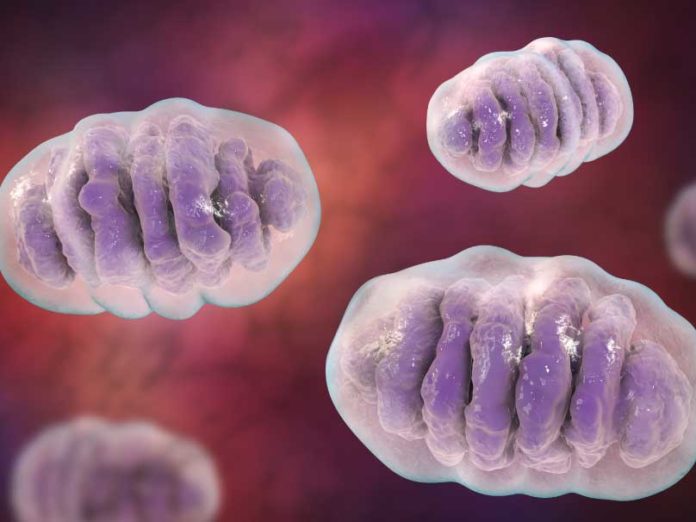



Great summary. It took me many months and countless hours to find 80% of the information that you provide here.
One very important note : Revlimid (cancer drug) efficacy is down-regulated by increases in glutationine. For this reason, my pharmacist and oncologist recommend against much of the supplements that you mention here. Many oncologists and pharmacists that I’ve interacted with during the past three years are not aware of the interaction. I pains me to know that some people are taking counterproductive supplements… and will never find out.
Hi Carl,
Thank you for the kind words! I am glad you found my article helpful.
Warmest regards,
Dr. Maxwell